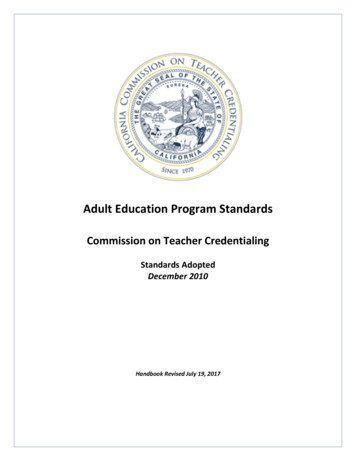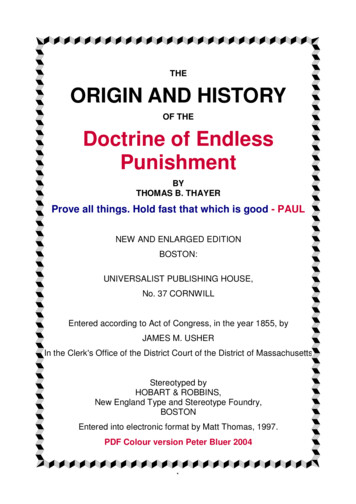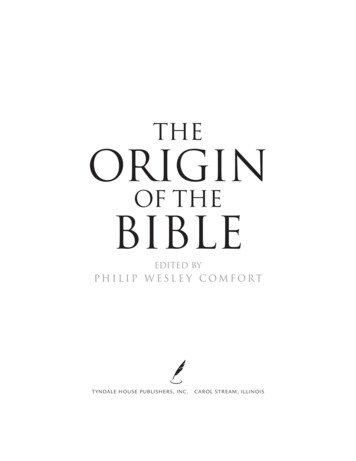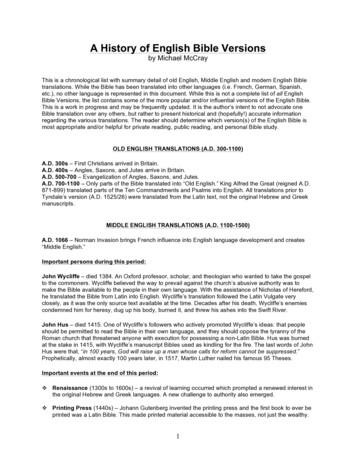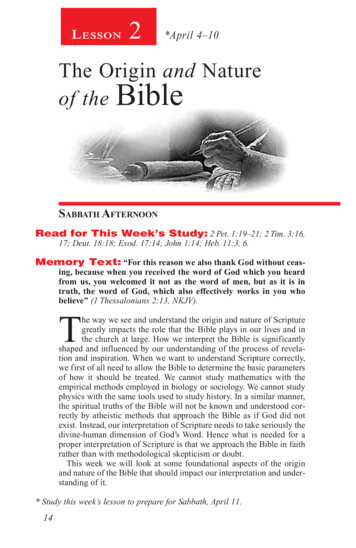
Transcription
L esson2*April 4–10The Origin and Natureof the BibleSabbath AfternoonRead for This Week’s Study: 2 Pet. 1:19–21; 2 Tim. 3:16,17; Deut. 18:18; Exod. 17:14; John 1:14; Heb. 11:3, 6.Memory Text: “For this reason we also thank God without ceas-ing, because when you received the word of God which you heardfrom us, you welcomed it not as the word of men, but as it is intruth, the word of God, which also effectively works in you whobelieve” (1 Thessalonians 2:13, NKJV).The way we see and understand the origin and nature of Scripturegreatly impacts the role that the Bible plays in our lives and inthe church at large. How we interpret the Bible is significantlyshaped and influenced by our understanding of the process of revelation and inspiration. When we want to understand Scripture correctly,we first of all need to allow the Bible to determine the basic parametersof how it should be treated. We cannot study mathematics with theempirical methods employed in biology or sociology. We cannot studyphysics with the same tools used to study history. In a similar manner,the spiritual truths of the Bible will not be known and understood correctly by atheistic methods that approach the Bible as if God did notexist. Instead, our interpretation of Scripture needs to take seriously thedivine-human dimension of God’s Word. Hence what is needed for aproper interpretation of Scripture is that we approach the Bible in faithrather than with methodological skepticism or doubt.This week we will look at some foundational aspects of the originand nature of the Bible that should impact our interpretation and understanding of it.* Study this week’s lesson to prepare for Sabbath, April 11.14
S unday April 5The Divine Revelation of the BibleRead 2 Peter 1:19–21. How does Peter express his conviction about theorigin of the biblical prophetic message?The Bible is not like any other book. According to the apostle Peter,the prophets were moved by the Holy Spirit in such a way that thecontent of their message came from God. They did not invent it themselves. Rather than being “cunningly devised fables” (2 Pet. 1:16), theprophetic message of the Bible is of divine origin, and thus it is truthfuland trustworthy. “Holy men of God spoke as they were moved by theHoly Spirit” (2 Pet. 1:21, NKJV). God was at work in the process ofrevelation, where He made known His will to selected human beings.Direct verbal communication between God and particular humanbeings is an inescapable fact of the Scriptures. This is why the Bible hasspecial, divine authority, and we need to take the divine element intoconsideration in our interpretation of the Scriptures. Having our holyGod as their ultimate author, the biblical books are aptly called “holyScriptures” (Rom. 1:2, 2 Tim. 3:15).They were given for practical purposes, too. They are “useful forteaching, rebuking, correcting and training in righteousness, so that allGod’s people may be thoroughly equipped for every good work” (2 Tim.3:16, 17, TNIV).We also need the help of the Holy Spirit to apply to our lives whatGod has revealed in His Word. According to the apostle Peter, theinterpretation of the divinely revealed Word of God is not a matter ofour own opinions. We need God’s Word and the Holy Spirit to rightlyunderstand its meaning.Scripture also says, “Surely the Lord God does nothing, unless Hereveals His secret to His servants the prophets” (Amos 3:7, NKJV). Thebiblical words for “revelation” (in its various forms) express the ideathat something previously hidden has now been disclosed or unveiledand thus becomes known and made manifest. As human beings, weneed such an uncovering, or revelation, for we are sinful beings, separated from God because of our sin, and therefore dependent upon Himto know His will.It’s hard enough obeying the Bible even when we believe in itsdivine origin. What would happen if we came to distrust or evento question that divine origin?15
M onday April 6The Process of InspirationBecause God uses the medium of language to reveal His will tohumankind, divine revelation is capable of being written down. Yet, aswe already have seen, the Bible is the result of God’s revealing truth tous through the work of the Holy Spirit, who transmits and safeguardsHis message through human instruments. This is the reason why we canexpect the fundamental unity that is seen in all of Scripture from Genesisto Revelation (for example, compare Gen. 3:14, 15 to Rev. 12:17).Read 2 Peter 1:21; 2 Timothy 3:16, 17; and Deuteronomy 18:18. Whatdo these texts say about the inspiration of Scripture?All of Scripture is divinely inspired, even if not all parts are equallyinspiring to read or even necessarily applicable to us today (for example, the sections about the Hebrew feasts were inspired even thoughwe’re not required to keep them today). Yet, we need to learn from allof Scripture, even from those parts that are not so easy to read andunderstand or that are not specifically applicable to us now.Also, not everything in the Bible was directly or supernaturallyrevealed. Sometimes God used biblical writers who carefully investigated things or used other existing documents (see Josh. 10:13, Luke1:1–3) to communicate His message.Even then, all Scripture is inspired (2 Tim. 3:16). This is the reason why Paul states that “whatever” was written, was written for ourinstruction, so that through “the encouragement of the Scriptures wemight have hope” (Rom. 15:4, NASB).“The Bible points to God as its author; yet it was written by humanhands; and in the varied style of its different books it presents the characteristics of the several writers. The truths revealed are all ‘given byinspiration of God’ (2 Tim. 3:16); yet they are expressed in the wordsof men.”—Ellen G. White, The Great Controversy, p. 7.Today there are biblical scholars who deny divine authorship ofmany parts of the Bible, even to the point where many crucialteachings—Creation, the Exodus, the Resurrection—are denied.Why is it so essential that we not open that door—even a bit?After all, are we to pass judgment upon the Word of God?16
T uesday April 7The Written Word of God“Then the Lord said to Moses, ‘Write these words, for accordingto the tenor of these words I have made a covenant with you and withIsrael’ ” (Exod. 34:27, NKJV). Why would the Lord have Moses writedown these words as opposed to having Moses recite them to thepeople only? What is the obvious advantage of the Written Word?The God who speaks and who created human language enables chosen people to communicate the divinely revealed truths and divinelyinspired thoughts in a trustworthy and reliable manner. Hence, it is nosurprise to find that God commanded biblical writers early on to commit His instruction and revelation in writing.What do the following texts teach about written revelation?Exod. 17:14, Exod. 24:4Josh. 24:26Jer. 30:2Rev. 1:11, 19; Rev. 21:5; Rev. 22:18, 19Why did God command that His revelation and inspired messagesbe written down? The obvious answer is so that we will not forget themso easily. The written words of the Bible are a constant reference pointthat directs us to God and His will. A written document usually can bepreserved better and be much more reliable than oral messages, whichmust be told again and again. The Written Word, which can be copiedagain and again, also can be made accessible to many more people thanif it were spoken only. Last, we can speak to a limited number of peopleat one time in one place, but what is committed to writing can be read bycountless readers in many different locations and continents, and even bea blessing numerous generations later. In fact, if people can’t themselvesread, others can read a written document aloud to them.17
W ednesday April 8The Parallel Between Christand ScriptureRead John 1:14; John 2:22; John 8:31, 32; and John 17:17. What parallels do you see between Jesus, the Word of God made flesh, andScripture, the Written Word of God?There is a parallel between the Word of God, who became flesh(i.e., Jesus Christ), and the Written Word of God (i.e., Scripture). Justas Jesus was supernaturally conceived by the Holy Spirit yet born ofa woman, Holy Scripture also is of supernatural origin yet deliveredthrough human beings.Jesus Christ became a man in time and space. He lived during a specific time and at a specific place. Yet, this fact did not nullify His divinity,nor did it make Jesus historically relative. He is the only Redeemerfor all people, all over the world, throughout all time (see Acts 4:12).Likewise, God’s Written Word, the Bible, also was given at a specifictime and in a particular culture. Just like Jesus Christ, the Bible is nottime-conditioned (i.e., limited to a specific time and location); instead,it remains binding for all people, all over the world.When God revealed Himself, He came down to the human level. Jesus’human nature showed all the signs of human infirmities and the effectsof some 4,000 years of degeneration. Yet, He was without sin. Similarly,the language of Scripture is human language, not some “perfect superhuman” language that no one speaks or is able to understand. Whileany language has its limitations, the Creator of humankind, who is theCreator of human language, is perfectly capable of communicating Hiswill to human beings in a trustworthy manner without misleading us.Of course, every comparison has its limits. Jesus Christ and HolyScripture are not identical. The Bible is not an incarnation of God.God is no book. God in Jesus Christ became human. We love the Biblebecause we worship the Savior proclaimed in its pages.The Bible is a unique and inseparable divine-human union. Ellen G.White saw this clearly when she wrote: “The Bible, with its God-giventruths expressed in the language of men, presents a union of the divineand the human. Such a union existed in the nature of Christ, who wasthe Son of God and the Son of man. Thus it is true of the Bible, as it wasof Christ, that ‘the Word was made flesh, and dwelt among us.’ John1:14.”—Ellen G. White, The Great Controversy, p. 8.Why must the Scripture be foundational to our faith? Without it,where would we be?18
T hursday April 9Understanding the Bible in FaithRead Hebrews 11:3, 6. Why is faith so essential in understanding Godand His Word? Why is it impossible to please God without faith?All true learning takes place in the context of faith. It is the implicitfaith of the child toward his or her parents that enables the child to learnnew things. It is a trusting relationship that guides the child to learnthe basic and fundamental aspects of life and love. Knowledge andunderstanding, therefore, grow out of a loving and trusting relationship.In the same vein, a good musician plays a piece of music well whenhe or she not only masters the technical skills that help one to play aninstrument but also when he or she exhibits a love for the music, thecomposer, and the instrument. In a similar way, we do not understandthe Bible correctly when we approach it with an attitude of skepticismor methodological doubt, but in a spirit of love and faith. The apostlePaul wrote, “Without faith it is impossible to please God” (Heb. 11:6,NIV). Thus, it is indispensable to approach the Bible in faith, acknowledging its supernatural origin, rather than seeing the Bible just as ahuman book.Seventh-day Adventists clearly have expressed this insight into thesupernatural origin of Scripture in the first fundamental belief of theSeventh-day Adventist Church, which states: “The Holy Scriptures,Old and New Testaments, are the written Word of God, given by divineinspiration. The inspired authors spoke and wrote as they were movedby the Holy Spirit. In this Word, God has committed to humanitythe knowledge necessary for salvation. The Holy Scriptures are thesupreme, authoritative, and the infallible revelation of His will. Theyare the standard of character, the test of experience, the definitiverevealer of doctrines, and the trustworthy record of God’s acts in history. (Ps. 119:105; Prov. 30:5, 6; Isa. 8:20; John 17:17; 1 Thess. 2:13;2 Tim. 3:16, 17; Heb. 4:12; 2 Peter 1:20, 21.)”What are people missing in their understanding of the Biblewhen they do not approach Scripture from an attitude of faith?Why is this faith not blind? That is, what are the good reasonsthat we have for this faith and why is faith still a necessity whendealing with the truths of the Bible?19
F riday April 10Further Thought: Read the following pages from the document“Methods of Bible Study”: “2. Presuppositions Arising From the Claimsof Scripture,” part a “Origin” and part b “Authority.” (“Methods of BibleStudy” can be found at s essential as the Bible is to our faith, it alone would be of no realspiritual value to us were it not for the influence of the Holy Spirit inour hearts and minds as we read and study it.“In His word, God has committed to men the knowledge necessaryfor salvation. The Holy Scriptures are to be accepted as an authoritative, infallible revelation of His will. They are the standard of character,the revealer of doctrines, and the test of experience. . . . Yet the fact thatGod has revealed His will to men through His word, has not renderedneedless the continued presence and guiding of the Holy Spirit. On thecontrary, the Spirit was promised by our Saviour, to open the word toHis servants, to illuminate and apply its teachings. And since it was theSpirit of God that inspired the Bible, it is impossible that the teachingof the Spirit should ever be contrary to that of the word.”—Ellen G.White, The Great Controversy, p. 9.Discussion Questions: Why does God reveal Himself and His will to us? Why do weneed revelation? How does God reveal Himself? God uses different means toreveal something about Himself. He does so in a more generalway through nature—but more specifically through dreams (Dan.7:1); visions (Gen. 15:1); signs (1 Kings 18:24, 38); and through HisSon, Jesus Christ (Heb. 1:1, 2). Has God revealed Himself to youpersonally? Share your experience. Some Bible scholars reject many of the teachings of the Bible,seeing them as mere myths. Teachings such as the Creation story,a literal Adam and Eve, the Exodus, and the stories of Daniel arejust a few examples (from the Old Testament) of teachings that aredismissed as nothing but made-up stories designed to teach spiri tual truths. This is what happens when humans pass judgmentupon God’s Word. What should this tell us about how dangeroussuch an attitude clearly is? God has revealed His will in a powerful way in the Bible. Yet,God desires your help in spreading His will and the good newsof His salvation in Jesus Christ alone. When people observe you,what kind of God do they see in you and through your behavior?20
Storyi n s i d eThree Filipino Baptismsin CyprusBy Andrew McChesney, Adventist MissionYolanda Malla, a Filipino domestic worker in Cyprus, saw that her friendBeatrise had tagged her in a Seventh-day Adventist sermon on Facebook.Malla had met Beatrise, a Filipino domestic worker in Israel, several yearsearlier when they both worked as domestic helpers in Taiwan. Malla remembered that Beatrise had been baptized recently in Israel.“Why did you become a Seventh-day Adventist?” she wrote on Facebook.“This is where I feel comfortable,” Beatrise replied. “Just watch the video thatI sent you, and you’ll understand.”Malla clicked on the video and heard a sermon about God setting aside theseventh-day Sabbath at Creation, reminding His people to keep the Sabbathwith the Ten Commandments, and calling for Sabbath observance throughoutthe New Testament. Malla was surprised and checked the sermon’s texts in theBible. She saw that the Sabbath was on Saturday.Why have I gone to so many churches and never heard a pastor preach aboutthe Sabbath? she wondered. Why does no one else talk about the Sabbath?She called Beatrise. “This has opened my mind!” she said. “I want to find thischurch that keeps the Sabbath, but where can I find it in Cyprus?”Beatrise did some research and sent the telephone number of BranislavMirilov, president of the Adventist Church in Cyprus. Malla called and receiveddirections to the church in her town, Limassol.Malla began attending the church’s Bible study group on Sundays. Soon sheinvited a cousin, Michelin, also a domestic worker in Cyprus, to accompany her.Then she invited another Filipino domestic worker, Maria, to attend as well. ButMaria cared for an elderly woman who needed round-the-clock care, and shecouldn’t get permission to leave the house.“No problem,” said Marica Mirilov, who is married to the church presidentand works as a Bible worker. “We can do the Bible studies on FacebookMessenger.”In a short time, Malla, Michelin, and Maria were baptized.Leading friends to baptism is the natural result of knowing Jesus,said Yolanda Malla, 42, a single mother, still working in Cyprusto support seven- and eight-year-old sons in the Philippines.“Even though I come from a broken home, I have strengthbecause I have learned that I have hope,” she said.Part of the Thirteenth Sabbath Offering this quarter willhelp construct a new church building and community center inNicosia, Cyprus.Provided by the General Conference Office of Adventist Mission, which uses Sabbath Schoolmission offerings to spread the gospel worldwide. Read new stories daily at AdventistMission.org.21
prophetic message of the Bible is of divine origin, and thus it is truthful and trustworthy. “Holy men of God spoke as they were moved by the Holy Spirit” (2 Pet. 1:21, NKJV). God was at work in the process of revelation, where He made known His will to selected human beings.



